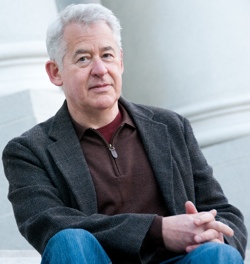A strange notion occurred to me in the middle of the night a couple of weeks ago. I woke up at about 1:00 AM, couldn’t get back to sleep immediately, and suddenly was struck by two unexpected but related thoughts. The first was that four out of my five novels are in some way a variation of Mozart’s The Marriage of Figaro. Or perhaps, to be more historically accurate, of Beaumarchais’ play on which the Mozart-Di Ponte opera is based. Or, to be even more historically accurate, of commedia dell’arte and its traditional figure of Harlequin. I would hazard a guess that Harlequin was an inspiration for Beaumarchais when he devised the character of Figaro. Figaro is a more realistic, more humanized, more up-to-date (18th century style) incarnation of Harlequin. And in that interval of sleeplessness I recognized that my protagonists are often 20th century versions of a similar figure, or in any event a figure who finds himself in a comparable situation.
In commedia dell’arte, Harlequin is a servant frequently ill-treated by his master. In Beaumarchais’s telling, he is a barber whose duties go far beyond simply cutting hair; he’s commonly tasked with running difficult errands and cleaning up his master’s messes. His competence is a crucial aspect of his character. He is a factotum, always on call to solve any kind of problem. Here he is, for example, in a representation by Rossini rather than Mozart, but in an opera based on another play about Figaro by Beaumarchais
Although cleverer than his master, more ingenious, more resourceful, Figaro is also at his master’s mercy. And his master frequently takes advantage of Figaro’s inferior position. Figaro must find ways to utilize his wiles and superior intellect to manipulate his master, Count Almaviva, and dodge his worst schemes. Here, for example — courtesy of Mozart this time — is how Figaro reacts when he learns the Count plans to bed Figaro’s betrothed.
It is this sort of conflict, this asymmetrical warfare between a powerful bullying alpha and the beta he feels empowered to victimize, that must have appealed to me without my even being aware of it. The drama inherent in the situation, not to mention its sheer unfairness, inspired a variety of possible plots over the years, plots sufficiently different from one another that I was at best only dimly aware of their family resemblance. The reason I found this situation so resonant and so creatively inspiring is something I choose not to examine too closely. I’ll save that for an analyst’s couch some day in the future. But it’s there, and it animates a lot of the emotion and generates a lot of the action in my books.
The second thing that occurred to me during that insomniac episode is that my current novel also has distant reverberations of Richard Strauss’s Der Rosenkavalier. Because this resemblance concerns a plot development in the novel I’d prefer not to spoil, I’ll leave it for readers to discover. But again, it was utterly unconscious on my part, and of course it may be nothing beyond an odd coincidence. Still, the fact that I find echoes of two different operas in a book whose mis en scene centers on the San Francisco Opera is if nothing else a happy accident.








0 Comment